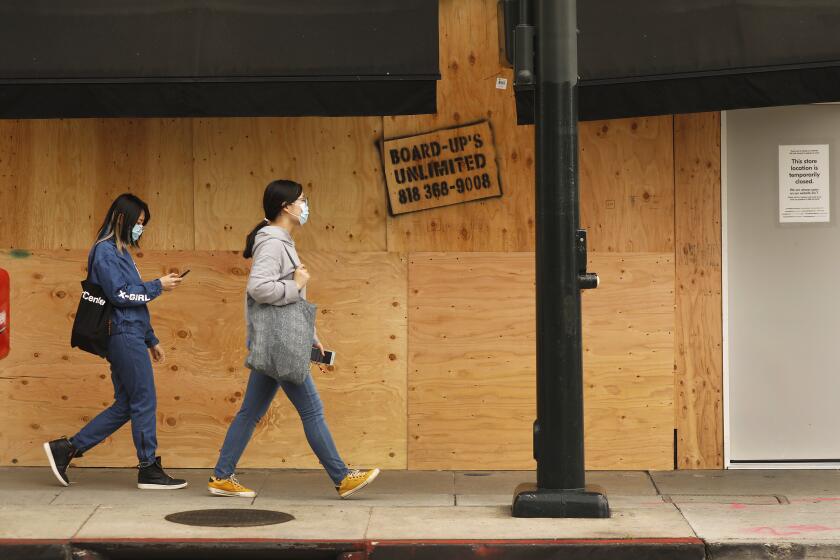Forget UBI, says an economist: It’s time for universal basic jobs
- Share via
Economic orthodoxy has been shaken by events of the last decade, with new enthusiasm for the old idea that states should spend freely during tough times. The 2008 crisis and this year’s CARES Act are powerful counterexamples to the idea that government spending drives inflation. We’ve seen that when the public sector spends money on things the private sector doesn’t want (say, the labor of 30 million people), it doesn’t bid up prices.
Economist Pavlina Tcherneva seizes this once-in-a-century moment to posit a spending program more ambitious, and likely more effective, than minimum wage hikes and universal basic income. In “The Case For a Job Guarantee,” out this week, she proposes a new way of thinking about work itself. It’s a sprightly pamphlet, a vision of a more humane world where federal spending is treated as a public utility, there to mobilize the nation’s resources in ways that benefit the many, not the few. It could not be more timely, and Tcherneva’s introduction frames this pre-pandemic essay for our precise moment.
Tcherneva proposes a “counter-cyclical” tool to create jobs: When the economy contracts, anyone who needs work walks into an unemployment office and takes their pick of good, living-wage jobs doing green work and care work — from solarizing homes to looking after the vulnerable. During expansions, we avoid the paradox wherein employers don’t like to hire people who have been out of the workforce for extended times. To lure those workers out of their Jobs Guarantee gigs, employers will have to offer a higher wage and better conditions. Tcherneva spoke with The Times about her proposal and how it can fix America’s true minimum wage, which for those without a job is zero.
California’s jobless rate barely budged in May, edging down to 16.3% from 16.4%, as employers continued to shed jobs.
What’s your book about?
I want to challenge us to imagine a world where any person who wants to find a decent-paying job can always find it; to explain why we should reject the ingrained consensus that there’s little we can do about unemployment. When we are faced with the option of unemployment or employment, I believe the superior choice is to secure the right to a job in a way that provides socially useful work.
How would that work?
Governments guarantee all sorts of things: loans, contracts. It’s not novel for the public sector to provide guarantees. We don’t rely on the market to solve poverty or education.
So, if we’re going to manage unemployment by creating jobs on demand, how should we do it? Not necessarily with big federal projects. Rather, the government could fund jobs proposed by agencies, states and localities, but also folks who are doing social work on the ground, through nonreligious, nonpolitical, nonprofit organizations struggling to fill gaps left by the market.
We’d solicit projects: concrete things for the communities where we live. Environmental rehabilitation, renewal and monitoring, the invisible green work that has to be done. On top of that, all our care needs! Being a companion for elderly people, helping with housework and errands. We need to reassess what we class as productive jobs. Community theater is enormously productive.
The local unemployment office becomes a true employment office. Show up there and get a choice of jobs fitted to your capabilities, everything from physical work to online work — documenting historical sites, improving maps, transcribing genealogy records, oral histories of COVID. Once we start thinking about what we could do, the sky’s the limit.
This feels like the right moment for this book. We’re looking at tens of millions unemployed.
I wrote this before the pandemic. Now we have massive unemployment and unprecedented government intervention. Crisis concentrates the mind. This is a moment where people rally around the idea of jobs creation. We’re talking about returning to FDR’s playbook, which is fine, but we’re still talking about a Jobs Guarantee in the context of “the crisis.” When you do something like this very quickly, inevitably you have problems, and that leads us to retire these programs as the economy starts stabilizing. “Problems” are inevitable, but they’re not a litmus test for whether a program is desirable.
I fear the idea of a “natural rate of unemployment” will come back with a vengeance unless we banish it. We’ll throw a lot of money at different jobs programs, and when the economy recovers, austerity returns. Economists would say, “Look, we’ve never experienced a shock like this before, the ‘natural rate’ is now permanently higher.” That happened after 2008: People permanently lowered their expectations for what they should expect from the labor market; lowered them so far that economists could call the next decade “the longest expansion in history.”
The question everyone asks at this point is, “How will you pay for it?”
Look, we always end up using the public purse to pay for joblessness. Right now, we use it to pay for unemployment. We could use it to pay for employment instead. I came to the Jobs Guarantee from a macroeconomic perspective — the realization that we were using unemployed people as a kind of “buffer stock” to control inflation. Having unemployed people means that when the economy grows, those people would be there to take those jobs.
But what if we could use employment as a buffer stock? That’s obviously the superior option. I realized that you couldn’t just argue about this as a macroeconomic policy, you have to bring in the human rights framework, the moral framework. You have to think about the kind of neglect, the health effects, the pain that unemployment inflicts on people who want to work.
If this is a timely idea, is it a new one?
The Jobs Guarantee has been around for a long time, it’s an old idea. The “payfor” question is a new straitjacket that holds it back. I’d hoped after 2008 that it would be clear that we had the budget for whatever we value. The $2.3 trillion CARES Act was enough to pay every worker’s wage for three months and create a Jobs Guarantee. The money is there. We pay to help people who lose their homes to fires and floods, but we don’t pay workers to rehabilitate their environments to prevent fires and floods.
Back to the crisis. Someday we’ll be allowed back out of the house and tens of millions of us will be looking for work. What happens if we don’t have a Jobs Guarantee?
I want to stress, this is not punitive. We are providing jobs, not requiring them. The progressive answer to stuctural unemployment is a jobs guarantee. The reactionary version is workfare. If we leave this to right-wing authoritarian governments, they’ll have punitive public works programs. They’ll make unemployed people build border walls. Unless progressives wake up to something bolder and bigger than just solving this crisis, I fear that the future is bleak.
Doctorow is the author of “Radicalized,” “Walkaway” and other books. He lives in Burbank.
More to Read
Sign up for our Book Club newsletter
Get the latest news, events and more from the Los Angeles Times Book Club, and help us get L.A. reading and talking.
You may occasionally receive promotional content from the Los Angeles Times.








